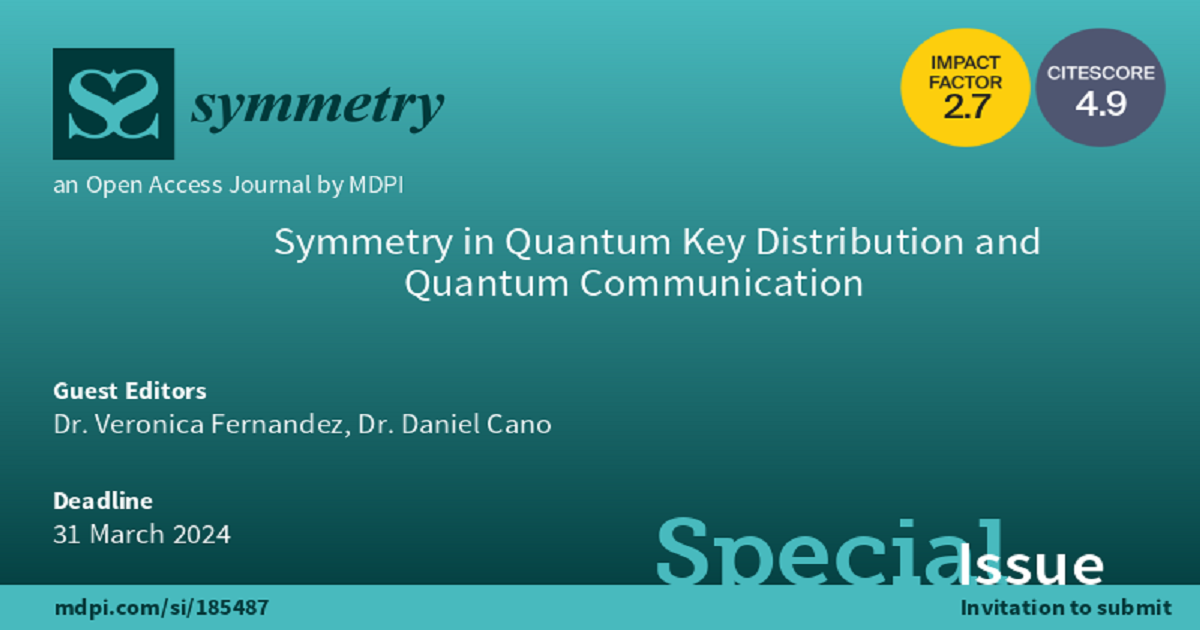Symmetry in Quantum Key Distribution and Quantum Communication
A special issue of Symmetry (ISSN 2073-8994). This special issue belongs to the section "Mathematics".
Deadline for manuscript submissions: closed (31 January 2025) | Viewed by 1358

Special Issue Editors
Interests: quantum key distribution; quantum communication
Interests: light-matter interactions for applications in quantum information and metrology
Special Issue Information
Dear Colleagues,
Quantum key distribution (QKD) is a secure communication method based on the principles of quantum mechanics that provides unconditionally secure communication. QKD is a solution to the problem of key distribution in cryptographic systems. The security of QKD is based on the laws of quantum mechanics rather than computational complexity. Device-independent quantum key distribution (DIQKD) is a version of QKD that provides a stronger notion of security. DIQKD can be performed at a speed beyond that of traditional QKD. The quantum communication system, which includes quantum key distribution, plays an important role in secure and high-speed communication. Symmetry plays a fundamental role in the fields of quantum key distribution (QKD) and quantum communication, enabling secure and efficient transmission of information using the principles of quantum mechanics.
This Special Issue intends to present a panorama of current developments in this area.
We look forward to receiving outstanding contributions addressing the following topics:
- Quantum key distribution;
- Quantum communications;
- Quantum network;
- Cryptographic systems.
Please note that all submitted papers must be within the general scope of the Symmetry journal.
Dr. Veronica Fernandez
Dr. Daniel Cano
Guest Editors
Manuscript Submission Information
Manuscripts should be submitted online at www.mdpi.com by registering and logging in to this website. Once you are registered, click here to go to the submission form. Manuscripts can be submitted until the deadline. All submissions that pass pre-check are peer-reviewed. Accepted papers will be published continuously in the journal (as soon as accepted) and will be listed together on the special issue website. Research articles, review articles as well as short communications are invited. For planned papers, a title and short abstract (about 100 words) can be sent to the Editorial Office for announcement on this website.
Submitted manuscripts should not have been published previously, nor be under consideration for publication elsewhere (except conference proceedings papers). All manuscripts are thoroughly refereed through a single-blind peer-review process. A guide for authors and other relevant information for submission of manuscripts is available on the Instructions for Authors page. Symmetry is an international peer-reviewed open access monthly journal published by MDPI.
Please visit the Instructions for Authors page before submitting a manuscript. The Article Processing Charge (APC) for publication in this open access journal is 2400 CHF (Swiss Francs). Submitted papers should be well formatted and use good English. Authors may use MDPI's English editing service prior to publication or during author revisions.
Keywords
- quantum key distribution
- quantum communications
- quantum network
- cryptographic systems
Benefits of Publishing in a Special Issue
- Ease of navigation: Grouping papers by topic helps scholars navigate broad scope journals more efficiently.
- Greater discoverability: Special Issues support the reach and impact of scientific research. Articles in Special Issues are more discoverable and cited more frequently.
- Expansion of research network: Special Issues facilitate connections among authors, fostering scientific collaborations.
- External promotion: Articles in Special Issues are often promoted through the journal's social media, increasing their visibility.
- Reprint: MDPI Books provides the opportunity to republish successful Special Issues in book format, both online and in print.
Further information on MDPI's Special Issue policies can be found here.





